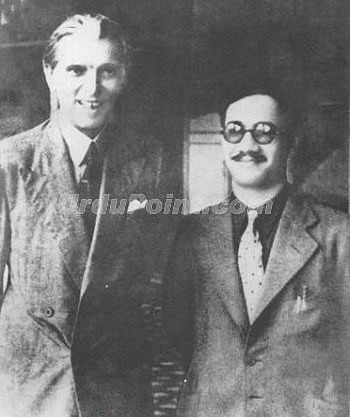Written by: Senator Mushahid Hussain Sayed
Posted on: March 22, 2024 |  | 中文
| 中文
Quaid-e-Azam at Minto Park, Lahore (23 March 1940)
"Few individuals significantly alter the course of history. Fewer still modify the map of the world. Hardly any one can be credited with creating a nation-state. Mohammad Ali Jinnah did all three".
(American historian, Professor Stanley Wolpert)
84 years ago, on March 23, 1940, the All India Muslim League convened under the leadership of the Quaid-i-Azam at its historic session in Lahore, and laid out its vision for a separate Muslim homeland. Seven years after expounding that vision, Pakistan became a reality. In the quest for Pakistan, the Quaid-i-Azam had no army, no atom bomb, no big money and no Establishment to back him, but his moral authority and credibility stemmed from his unimpeachable character, courage of convictions, and the unflinching faith of Muslim masses in his leadership. Professor Stanley Wolpert has best summed this monumental achievement in the above-mentioned quote from his seminal biography of the Quaid, "Jinnah of Pakistan".
The political path to the Lahore Resolution in 1940 was actually laid in Lucknow, when the Muslim League met under the Quaid's leadership for an important conference in October 1937. The Congress ministries then had openly discriminated against Muslims in even the Muslim majority provinces, despite the Congress’ public espousal of secularism. It was at Lucknow that the Quaid-i-Azam’s symbolic transformation in appearance took place, as he abandoned his impeccably tailored Saville Row suits for "Sherwani”, and also donned the famous “Jinnah cap". And it was also at Lucknow that his followers gave him the title of the Quaid-i-Azam or “the Great Leader”.

Quaid with the Raja Sahib of Mehmoodabad, who hosted the Muslim League session of 1937 in his house in Lucknow
For the Quaid-i-Azam, it was a long and protracted journey, involving a course correction as well, because he realised that despite his best efforts to forge ‘Hindu-Muslim Unity’, the Congress Party, with its majoritarian mindset, was unwilling and unable to politically accept the Muslim League as the legitimate representative of Muslims. This is what made the 1947 ‘parting of the ways’ both necessary and inevitable. Interestingly, the Quaid-i-Azam was the most enlightened of all Indian leaders, never looking at issues through the prism of communalism, but always upholding the rule of law. When the British colonial raj promulgated the black law, "Rowlatt Act", the Quaid-i-Azam resigned in protest from the Imperial Legislative Council. He spoke for the human rights of the young revolutionary Bhagat Singh, who was accused of terrorism by the British. The Quaid was a strong proponent of rights of minorities as well as women's empowerment, supporting the Sarda Bill against child marriage in 1916, and the Shariat Bill in Punjab that gave Muslim women property rights although the landed politicians were opposed to it.
Even today, when we compare Pakistan with India, the contrasts are evident. As India becomes more exclusive, bigoted and divisive, Pakistan is showing signs of being more inclusive, cohesive and diverse. Modi's India is burying the legacy of their founding fathers like Mahatma Gandhi and Jawaharlal Nehru. Modi has publicly referred to India’s ‘1200 years of slavery’, a reference to centuries of Muslim rule. This deep-seated ‘Mahmud of Ghazni Complex’ is a combination of hatred and fear of the ‘Muslim outsiders’ who conquered and ruled India over the centuries, before the arrival of the British.
With the inexorable descent into a ‘Republic of Hindustan’, India's fault-lines are becoming more evident after the brutal annexation of Occupied Kashmir on August 5, 2019, followed by the divisive and discriminatory Citizenship Amendment Act (CAA) and the National Register of Citizens (NRC) by the Indian state.
Given this context, it is no accident that prominent Indian writers are now looking at the historical context with different lenses. The well-known Congress leader, Shashi Tharoor, recently said in a television interview that in light of what Modi's India has become, " Mohammad Ali Jinnah is winning" (meaning that the Quaid was right, after all!). Two years before Modi's blunder of annexation of Occupied Kashmir on August 5, 2019, the grandniece of Jawaharlal Lal Nehru, Nayantara Sahgal, wrote in The Guardian on August 5, 2017 that "another partition (of India) stares us in the face". She accused Modi's RSS of "dividing India once again into Hindus and others as the RSS wants to make the country a Hindu Rashtra", and she concluded that "we are rapidly marching towards a horrifying future".
It is this very ‘horrifying future’ that the Quaid-i-Azam foresaw for India’s Muslims 83 years ago, for which the Pakistan nation owes him an eternal debt of gratitude for we are now living as free citizens of a free country. And with the developments in India today, time and history have only vindicated the Quaid-i-Azam by the manner in which Modi's India is treating the minorities, in particular the Muslims.
The Economist cover story on India on January 23, 2020, appropriately summed up Modi’s "Intolerant India", underlining his design to transform India into a "chauvinist Hindu State", precisely what the Quaid-i-Azam had predicted with such prescience 84 years ago.
Click here for archival footage of Jinnah’s speech at Minto Park on 23rd March 1940
You may also like: